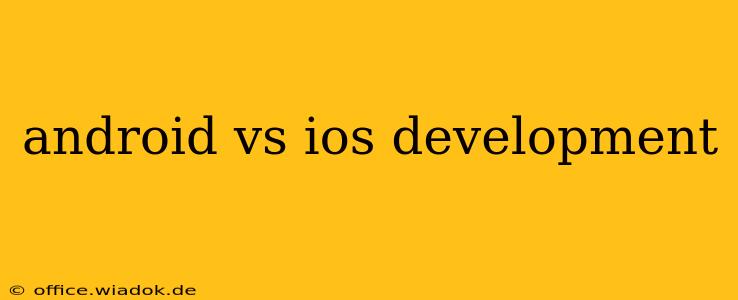The mobile app market is a battleground dominated by two titans: Android and iOS. Choosing between these platforms for your app development project is a crucial decision, impacting everything from your target audience and development costs to long-term maintenance and potential revenue. This in-depth comparison will explore the key differences between Android and iOS development, helping you make an informed choice.
Target Audience: Reaching the Right Users
One of the most significant differences lies in the user base. Android, with its open-source nature and broad device compatibility, boasts a vastly larger global market share. This translates to a potentially massive audience for your app. However, this comes with a caveat: Android users exhibit more diverse demographics and technological proficiency levels, potentially requiring more extensive testing and optimization across various devices.
iOS, on the other hand, holds a strong position in specific geographic regions and demographics, typically associated with higher disposable income and a preference for premium products. iOS users generally exhibit higher app engagement and are more likely to make in-app purchases. While the user base is smaller than Android's, it often translates to a more lucrative and engaged audience.
Key Differences Summarized:
| Feature | Android | iOS |
|---|---|---|
| Market Share | Significantly larger globally | Smaller, but highly engaged and lucrative |
| User Demographics | Diverse, broader range | More homogenous, higher disposable income |
| Device Fragmentation | High | Low |
| App Store Approval | Relatively faster and less stringent | Slower and stricter approval process |
Development Costs and Complexity: Weighing the Pros and Cons
Android development, using primarily Java or Kotlin, often presents a steeper learning curve due to the vast array of devices and screen sizes. The need for extensive testing across different Android versions and hardware configurations increases development time and costs. However, the open-source nature of Android provides access to a wider range of tools and resources, potentially lowering some costs in the long run.
iOS development, primarily using Swift or Objective-C, generally offers a more streamlined development experience. The relatively consistent hardware and software ecosystem simplifies testing and optimization. However, the stricter Apple developer guidelines and higher initial investment in Apple-specific tools might lead to higher upfront development costs.
Development Cost Factors:
- Programming Languages: Kotlin/Java (Android) vs. Swift/Objective-C (iOS)
- Testing & Optimization: More extensive testing needed for Android due to fragmentation.
- Development Tools: Open-source tools are readily available for Android, while iOS development often requires Apple's specific tools and IDEs.
Monetization Strategies: Maximizing App Revenue
Both platforms offer various monetization options, including in-app purchases, subscriptions, and advertising. However, as mentioned earlier, the iOS user base's higher spending power often leads to higher revenue generation for iOS apps, particularly those employing in-app purchase or subscription models. Android's larger user base can also translate into significant revenue through advertising, if implemented effectively.
Choosing the Right Platform for Your App: A Strategic Approach
The optimal platform depends heavily on your app's target audience, budget, and long-term goals.
- Target a broad, diverse audience with a limited budget? Android development might be your better starting point.
- Focus on a high-spending, engaged user base and willing to invest more upfront? iOS development could be more profitable.
- Consider a cross-platform approach: Frameworks like React Native or Flutter allow you to develop for both platforms simultaneously, reducing development time and costs but potentially compromising on native performance.
Ultimately, thorough market research, careful consideration of your target audience, and a realistic assessment of your budget and development capabilities are critical to choosing the right path for your app development journey. Understanding the nuances of Android vs. iOS development empowers you to make informed decisions, maximizing your chances of building a successful mobile application.

